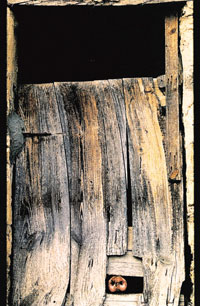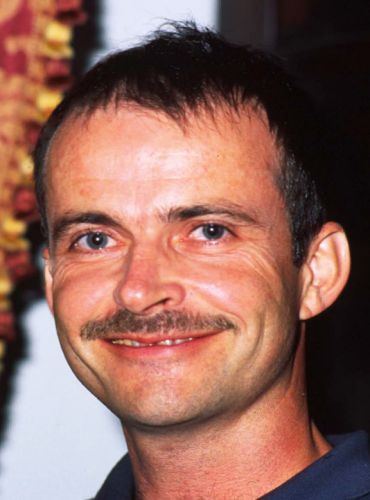A Belgian freelancer with an oddly familiar name, Kika D. has recently published a volume which reflects her work as a club photographer on Ibiza. Its striking rust-red cover features a mysterious, long-lashed eye - a travesti from La Marina, you assume - and an enigmatic title which challenges you to turn to the opening page. Faith, White Nights?? Few can resist a riddle, and the experience that follows might be likened to a New-age Trip, counterpoising local night-time glamour with the occasional snapshot from our celebrated pagès republic. Es Vedrà and an assortment of colourful Underground characters is followed by 'El Podenco Ibicenco'; 'Queens, Freaks and Friends' gives way to a spread on Ibiza's astrological ruler (Scorpio) with such chestnuts as "the Island will either welcome you or reject you, there's no use fighting it." Few who pick up this volume, one imagines, ever worry too much about the latter.
'The Magic of the Dancefloor', coming after these introductory vignettes, broaches the heart of the matter. Snaps of dancers and DJs accompany a brief summary of dance music with one of the tome's highlights: a diagram mapping the evolution of House and Techno, with all the many splinter movements of recent years. For someone more at home with Saint-Saëns than Roger Sánchez, this dummy's-guide was much appreciated. Deep House, Ambient House, Techhouse, Nu-House, Acid House - all are meticulously plotted and interconnected with weaving arrows. Island cognoscenti will doubtless have a quibble here or there, but the overall design is interesting, illuminating even.
At the centre of the book a section of Spanish poems provides a welcome interlude for anyone with a sound grasp of the lingo, accompanied by images drawn from nature and objects in decay. Then it's back to Party Central - friends sticking out tongues, DJs looking moody, and a transvestite with the poise of a serene Seurat promenader. For budding poets, a must-have section lists words which rhyme with party: 'illuminati', 'smartie', and 'photoelectricity'. Um, are you quite sure about that last one, Kika?
Following two gastronomic bonuses - recipes for herbes eivissenques and gallo al horno - we encounter the book's most arresting quotation: "What I love about Ibiza is that you can walk the streets with a piece of shit on your head and no one will question it." (Chris Gonzáles, Dub-Mag). Finally to the endpapers, where an unexpected freebie - a CD of Belgian dance tracks - meets our surprised gaze. The accompanying caution, printed in red and black, warns carbound listeners to behave responsibly: playing the object in question 'may invite 2 speed up.'
Kika was good enough to take time out of a busy summer schedule to explain the artistic philosophy which underpins this unique blend of the Balearics and Belgium. She has a charming frankness, 'a female version of Saint-Exupéry's Le Petit Prince' according to someone on the back cover, which transforms you into eager listener, especially when she tackles national traits observed en masse over drawn-out Amnesia montesols. We chat about her discovery of Andalusia in the 1990s, how she came south with a boyfriend to set up a B&B-cum-restaurant which was so successful that she later published a collection of short stories about the whole thing, Conejo con ciruelas (rabbit with prunes, a Belgian dish that sparked a local riot). There is far, far more to this eventful chapter of Kika's life, so we decide to leave it for another day. Ibiza is what occupies her every waking moment now - together with Belgium, of course. Unbeknownst to the rest of the planet, youth music in Europe's northern cockpit is undergoing an unexpected renaissance, with local groups forging a beat that merges many diverse strands from the international scene. We hunt about for a name. "Belgian fusion?" I suggest. Kika nods cautiously, although that doesn't quite capture the near-patriotic fervour, the buzz to be had from hanging in with a breed of local music mavericks. I learn to my surprise that Amsterdam's lax drug laws have recently made the Dutch capital so 'British' that locals are beating a path south for a taste of old-fashioned Dutchness. Not clogs and tulips, mind, but pub-chat and lyrics in an idiom (Flemish) they can get their tonsils round. When we put on the CD, I am taken aback to find the first track is French, but the music is reasonably accessible. 'It's about partying,' explains Kika, 'which is why I chose it as the lead-in for my Ibiza book.' Naturellement. We leave the music on while she elaborates on her ambition to make Belgian vibes better known elsewhere - and Ibiza ('the real Ibiza') better known in Belgium. This is the work's real raison-d'être, a multi-media letter straight from the heart. I apologize for my ignorance of her mother tongue, and vow to spurn Amsterdam for Antwerp on my next pilgrimage north. The riddle of the book's title is at last beginning to be solved: it is about 'faith' in a general sense, loyalty to one's country, as well as to an adopted island and to creative potential within (the beguiling eye on the cover is actually Kika's). As for 'white nights', it is a portmanteau term embracing not only the White Island and its notorious summer madness, but also snowbound (or fogbound) Flemish winters as a first-row fan of live music. Can live music be revived on Ibiza, perhaps even Belgian live music? Such matters rest in the lap of the gods, but Kika hopes that her modest contribution could make a small difference, somewhere along the line.
(All pictures © Kika D)
Martin Davies
martindavies@ibizahistoryculture.com

